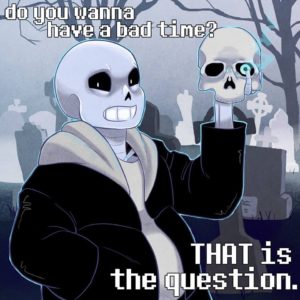
Crossover art commissioned from Sarah Parker (The Monster Ghost)
It is intriguing that in all of Hamlet’s most compelling monologs about depression, about suicide, and about the ennui of fatality, he is always (at least possibly) performing for people he believes to be spying on him. When he speaks to the actual audience, when he is without question himself, he is angry. He is angry at his mother, angry at his uncle, suspicious of his father, angry at himself, and admiring of strangers. Hamlet is a man who hates the familiar, especially himself, and respects the strange because it has not yet disappointed him. He is a man who trusts very few, and spends little time around those he trusts (Horatio, and presumably Marcellus), and hungers for the attention of those who are unknown or unknowable. These are, in my mind, very much the actions of a depressed person: disdain for the familiar parameters of his own life. Meanwhile, “depressed Hamlet,” his antic (or perhaps “antique”) disposition, seem very much to run along the lines of a performance: people think and indeed want him to be depressed, so he decides to “be depressed” for those people. The fact that his most famous speech of all time blends and doubles over this obscurity is particularly fascinating.
